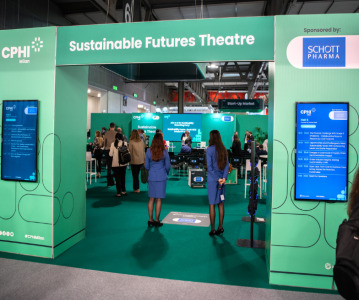‘FDA should withdraw ANDAs’ says expert

CPHI Worldwide's Annual Report suggests repeat offenders of regulatory infringements should be barred from importing into the US.
CPHI Worldwide – the world’s largest pharma event taking place in Frankfurt (5th-7th November 2019) – has released the first part of its eponymous 2019 Annual Report. Experts Bikash Chatterjee, President and Chief Science Officer at Pharmtech Associates and Girish Malhotra, President of EPCOT International discuss how new technologies can revolutionise manufacturing, but warn that regulators must change to prevent hindering future innovation.
Bikash Chatterjee forecasts a positive outlook for the medium and long-term future of the industry - Pharma 4.0, the Internet of Things (IoT), and Artificial Intelligence (AI) could ultimately deliver huge shifts in how we discover and develop medicines, even if the short-term applications may not bring the results people are striving for.
“There is no doubt we will see broader adoption of IoT on the shop floor and in the distribution portion of the supply chain in the short term. The biggest impact operationally, I believe, will be seen in the clinical trial management stage of the drug development lifecycle, over the next 5 years. During the next decade, however, AI could transform molecular selection and design,” commented Chatterjee.
Despite the call for these advances, Chatterjee emphasises that such improvements within the industry will not come about unless they are used in the right way, and address the right questions. He forewarns: “The focus on technology in the absence of understanding the basic question to be answered can derail a cross-functional initiative in the blink of an eye.” Chatterjee also calls for AI companies and pharmaceutical companies to gain a better understanding of each other’s fields to expedite the process of disruptive technology adoption.
“The challenge with anything new in our industry is that the organisations selling into life sciences don’t know drug development, and the drug sponsors interested in AI don’t really understand AI, so they cannot direct the solution provider very effectively. As this knowledge gap dissipates through experience on both sides, more effective pilot projects and solutions will be developed and brought to term,” says Chatterjee.
Moving into the longer-term future, Chatterjee envisages AI being used to deliver significant changes in therapies by 2040, when ‘it will be standard practice in the design of drug therapies, their processes and in the treatment of disease’. He predicts that ultimately this will mean personalizing dosing and drugs regimens designed around each patient’s genetic markers and circumstances.
Malhotra explores the cost of manufacturing globally and the still high levels of regulatory infringements, postulating that regulators should use powers to remove ANDAs for repeat offenders. “With FDA being short staffed, even the use of ‘risk-based inspections’ may be insufficient to catch less than quality/cGMP producers,” speculated Malhotra. He adds: “Repeated non-compliance to FDA’s requirements and guidelines should be a cause to forbid shipments to the US.”
In addition, he suggests a 90-day approval process, which will necessitate that companies filing applications have complete command of every facet of manufacturing, product quality, and labeling.
Taking this a step further, he also advocates enforcing mandatory deposits (circa $200,000) for first deviation from FDA’s expectations, with forfeiture of the deposit and, ultimately, being barred from importing into the US should further problems occur.
Fundamental to Malhotra’s regulatory proposals is the proposition that governing bodies should stick to enforcement - not preach to the market on how best to implement manufacturing processes. He added: “Pharma has not explored increased profitability through continued process improvements and my conjecture is that the regulators are the obstacle to this. The FDA should refrain from suggesting to companies what types of manufacturing processes (batch or continuous) they need or practice, instead they should concentrate on helping ensure manufacturing processes are repeatable using continuous improvement principles.”
CPHI Brand Director Europe, Orhan Caglayan, commented: “The CPHI Annual Report highlights the key issues and trends affecting the industry. Our experts explore the benefits of streamlined regulations and how technology could deliver tremendous improvements across the supply chain. Significantly, this year is also CPHI Worldwide’s 30th anniversary, which provides us with an opportunity to reflect on both how far the industry has come during this time, as well as where it is heading in the years to follow. With over 45,000 executives attending, our event is designed to help meet new partners and drive forward innovation. By bringing the supply chain together - from APIs and FDF, to machinery, packaging, outsourcing and, biopharma– we enhance the industry’s ability to find new cost-effective solutions and learn about new developments that will sustain growth in the year ahead”.
Related News
-
News Pfizer may shift production back to US under Trump pharma tariffs
At the 45th TD Cowen annual healthcare conference in Boston, USA, Pfizer CEO Albert Bourla outlined the potential for Pfizer to shift its overseas drug manufacturing back to the US as pharmaceutical industry players weigh their options against Presiden... -
News Women in Pharma: Connecting accessible pharma packaging to patients – a Pharmapack Special
Throughout our Women in Pharma series, we aim to highlight how CPHI events encourage discussions around diversity, equity, and inclusion initiatives in the pharmaceutical industry. -
News CPHI Podcast Series: Packaging expert perspectives at Pharmapack 2025
This month's podcast episode sounds a little different, covering the latest event in Paris – Pharmapack 2025. Digital Editor Lucy Chard speaks to several experts direct from the floor of the show, bringing you right in on the action.&nbs... -
News Closing 2024 with Editors' picks of top articles from the past year
Coming to the end of 2024 and it’s certainly been a busy year, for CPHI and for the rest of the pharmaceutical and healthcare industry. Topics of conversation throughout the last 12 months have been varied, touching on the technical, to the polit... -
News SCHOTT Pharma’s sustainable journey with CPHI
Sustainability is of paramount importance in the pharmaceutical industry. See how a recent partnership between CPHI and SCHOTT Pharma has helped to highlight and accelerate their sustainability journey to reach global goals. -
News CPHI Podcast Series: Investing in a vision for the future of life sciences
In this episode Lucy Chard is joined by Rajiv Khatau to discuss the importance of looking into new therapeutic areas and some of the more niche areas of pharmaceuticals, and investing in the future of the industry. -
News Lessons from CPHI Milan 2024: Sunny Intervals for Pharma Manufacturing?
As the 2024 CPHI conference wrapped up in Milan, we caught up with L.E.K. Consulting – a global strategy consulting firm with deep expertise in pharma manufacturing – to discuss evolving market perspectives and business outlook. -
News Women in Pharma: Reflections from Behind the Scenes
In this instalment of our monthly series, the team that brings you the Women in Pharma series each month sits down for a heart-to-heart on what the series means to them, and how they hope to continue their work in the future.
Position your company at the heart of the global Pharma industry with a CPHI Online membership
-
Your products and solutions visible to thousands of visitors within the largest Pharma marketplace
-
Generate high-quality, engaged leads for your business, all year round
-
Promote your business as the industry’s thought-leader by hosting your reports, brochures and videos within your profile
-
Your company’s profile boosted at all participating CPHI events
-
An easy-to-use platform with a detailed dashboard showing your leads and performance







